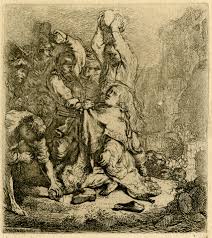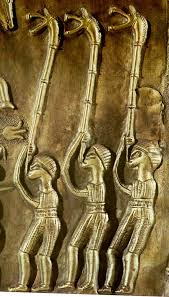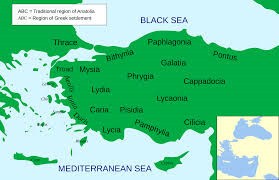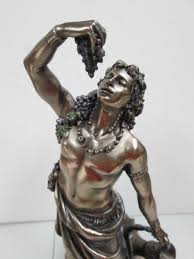How Stephen the martyr came to join Joseph and Mary, Essenes in Galilee: A study in Xenoglossy.
Posted on 08 January 2015, 13:20
What follows is undeniable evidence that the young man, Stephen, had been born in a village near Ancyra (Ankara) then in the province of Galatia, that he had travelled to Galilee, where he spent a two-year probation or novitiate preparing to join Joseph and Mary in an Essene camp there. The evidence helps us be sure that we are truly hearing from Stephen. We also hear Stephen’s own moving words about his early life.
Through trance medium Thomas Ashman I heard Stephen speak some puzzling words in the kind of Greek used in Thrace (now modern Bulgaria) and also in Galatia 2000 years ago. This phenomenon is called Xenoglossy. It took me 30 years to get sufficient information to understand the words properly, but in the end it seemed very clear that Stephen had spoken them to Joseph, the father of Jesus, who with Mary belonged to an Essene camp in Galilee. It seems that Stephen said this just before being accepted as an Essene. Joseph initiated him during a Messianic Communion service in which grape juice was diluted with water. ]

Etching: Stoning of Stephen: Rembrandt
[If you haven’t already done so, you should first read Acts 6.1-7.60)
If you have experienced Stephen’s wise and loving spiritual counsel in your heart, or in the pages of Afterlife Teaching from Stephen the Martyr, you will be interested in the Stephen who was alive at the time of Jesus.
This is what Stephen said to us about himself as a young man:
[April 1975] “Would you know of the times when Stephen was in doubt? When he walked and preached and still he doubted? Of the great fear, and the knowledge of tragedy that was in Stephen’s heart? Or the tears that Stephen shed for himself? of the ambitions, as your own, that were unrealised? Of the terror of death, of the fear of the opinions of others, the ambitions to wealth and fame, of the love of another that Stephen felt? Does this sound unfamiliar to you? This is how it was for Stephen, a young man, spoken of by his elders.. I recall that he was considered untidy, that he showed not the respect for his parents that he might, that he stole as a child foolish things, he gave that which did not belong to him, he taste for music was indifferent, he had many dislikes of the foods that he ate, he would wish for fine horses, but needed to pretend with a mule; he had ambitions of being a great soldier.
We could then count Stephen as failing in many of his ambitions, much to his gain. Stephen did not see success in much that he tried to accomplish. Often his testimony was mistaken. Very seldom was it well received. He had many moments of foolishness, and a great deal of laughter. He was inexpert when he travelled, and often he was unwise in his companionship. This then is Stephen. Is there more that you wish to know?” [Olive: Your awareness now.]
His awareness after his martyrdom.
“The awareness that I have is the gift of, and is part of the Father, as are we all. We think perhaps that Stephen is separated and that he is aware of everything in the way that Olive might be aware, of feels that she is aware. But this of course is not so. (It is true that) for a long period of what we might call time (after the death of his body) Stephen was separated, as many still are.”
[Here unfortunately the tape finished, and we are forced to reconstruct Stephen’s words from memory] “In his so-called separateness, Stephen attempted to be of service to the Father. But then in the course of what we call time, Stephen let go of the personality of Stephen, the tent which the Father had given him in which to be housed. And thus unclothed, he gave up his separateness to be one with the Whole. You will understand that when I speak to you, I re-enter this tent, I put on again the clothes of Stephen, I put on the robes of a saint, in order that you may feel comfortable, in order that you may walk with me in a way that to you is familiar.”
That is what Stephen said directly, about his childhood, and his life as a young man. He also said that he had been killed just before his 22nd birthday.
Another time he told us a great deal more through some words of puzzling Greek:
Those strange Greek words St Stephen spoke to us were part of what seemed to me like a wider and all embracing dream, there, alongside the waking world. From about 1970 I had been experiencing the strangest series of coincidences which were turning my picture of reality upside down. Then on May 21, 1973 a acquaintance delivered a book of prophecies from a woman friend who was unknown to me. Those prophecies largely came true. And I think it was on that very day, on the other side of the world, in Kent, that a London Jew, Thomas Ashman, began speaking Latin in his sleep. And his partner Olive heard it. Although he hadn’t previously been a medium, Tom found that after prayer he was able to fall into trance, and allow Stephen to begin a conversation with Olive. These conversations continued, until a fateful meeting with Olive, now here in New Zealand, in August. She asked me whether I would like to question Stephen. I was of course eager to do so.
September 21, 1973
After they arrived in New Zealand, Olive and one or two friends had been asking Stephen questions over about three months, recording and carefully transcribing what was said. She had showed me the transcripts, and the latest one puzzled me. Firstly it seemed as thoughTom had been spiritually receiving information for himself, then it seemed that it was St Peter speaking through Tom in trance, but then suddenly the communicator appeared to be St Stephen.
I had previously been receiving accurate intuitions, and what I received in this case indicated “Not St Peter”. So when I first had the opportunity to talk with Stephen through the entranced Tom, I challenged him about what had apparently been happening. It was of course a strange way to begin a relatioship with him, but it led to our discussing how to separate gold from the dross in what comes from the world of Spirit.
How was it that Stephen spoke in English? Stephen said that he knew no English, but was using the words already in Tom’s mind to express his meaning. That was puzzling because Stephen seemed such a very different person from Tom. In April next year I discussed with Tom the possibility of addressing Stephen in German, to bypass Tom’s mind, so to speak. I think Tom was a little hurt that I seemed confused about what was going on. But the days that followed were occupied with Tom and Olive preparing for their wedding, which took place in a registry office on the 13th May, 1974 .
After the ceremony they had a party, where much was eaten and drunk, stories from England’s war-time Royal Air Force were exchanged, which were often somewhat ribald. A two year old boy was present, who was permitted to take a sip of wine.
That evening we were in a different mood and wished to invite Stephen. But we wondered whether after such a day, it would be possible to have such a conversation. But Tom went into deep trance, and Stephen came, and without preamble, said, ”Karno dioti, dieta dioti, karno dioti, boro zelai Leneka mella diesta. But it would be better, I think, were I to speak with words that would bring a greater emotive response. In what way may I assist?”
We didn’t refer to Stephen’s seemingly nonsense words, but talked about other matters.The session however had been recorded, and on listening carefully I guessed them to be Greek. The words were carefully transcribed by two of the group as well as myself. I transcribed the sounds into the Greek alphabet, as [Karnw dioti, dieta dioti, karnw dioti borw zelai Lhneka mella diesta.]
I could see it was the kind of Greek I was familiar with, of the 1st century C.E. and described as “Koine Greek”, based on “the Attic Greek dialect that underwent [an adjustment] process when it came into contact with other Greek dialects spoken in the Athenian seaport Piraeus, and ultimately became the lingua franca of the Hellenistic world.”[Wikipedia article] It was the kind of Greek that I had learned in my theological studies at Oxford.
Here is an early attempt to translate Stephen’s words:
“For the Celtic horn, for the two year old, for the Celtic horn, for the greedy, the grape-juice [of the Athenian Lenes] should be diluted.”

[Celtic horns or Carnyxes, symbolising the Celtic born, or Celts.]
On hearing this, the group thought perhaps we were being told off for behaving like drunken Celts, and that the two year old should have have been given diluted grape juice. That was plausible: but why the reference to the Athenian grape-juice festival, the Lenes? And why “Zelai”, a word from the local language of Thrace, meaning “wine”? Thracian was never a written language, and the only reason why anyone would know about the word, is that in 600 BCE a Greek grammarian made a list of 24 Thracian words, “zelai”[=wine] being one of them. Anyone using the word “zelai” would have had to come from Thrace or be thoroughly familiar with its culture.

And there was another thing: the endings of some of the words were different from the “proper” ones of Athens. I was a bit bothered by this at the time. But twenty years later I got hold of an obscure grammar of Greek dialects, and found that the “wrong” endings were the “right” ones for Thrace. So we could be certain Stephen was speaking in the Thracian Greek dialect because of (1) the Thracian word endings, (2) “zelai=wine” from the local Thracian language (3) and then there was that reference to “Celt”. Why “Celt”? Had Thrace been dominated by Celts way back in the first century? Research showed that it had indeed.
When we talked to Stephen about the Greek, he did agree that he had spoken the Thracian Greek dialect, but said that he had actually been born in a village called Seletar, across the river from Ancyra, (now Ankara, in modern Turkey.) I asked him the meaning of the word “Seletar” and he said it meant “Fourth landing place”. Definitions in my Greek lexicon supported that translation. His home town Ancyra was in Galatia which was named for the immigrant Celts/Gauls from Thrace, who had settled there and become its ruling caste in the 3rd century BC, following the Gallic invasion of the Balkans in 279 BC. That is why they spoke that Thracian version of the Greek.
It seems that Celts and Jews together formed the ruling caste. If we have read his story in The Acts of the Apostles we can see that Stephen had been highly educated, endowed with many gifts of the Spirit. He didn’t say whether he was a Gentile (non-Jew) convert to Judaism, or was a Jew living in a Celtic area.
For whatever reason he must at some stage have made the long journey from Galatian Ancyra, I think first to Galilee in the north of Palestine, then later as a follower of Jesus to Jerusalem, where he was stoned to death , and thus became the first Christian martyr.
Had I understood those Greek words properly?
In 1974 I had taken dieta to mean “for the two year old”. Thirty years later, I realised that it can also mean “two years having passed.”
In 1974 I had taken Boro to mean ”for the greedy” which, because of the reputation of Celts drinking too much, I took as “drunkard.” But thirty years later an academic pointed out that “boro” can also be translated as “with grape juice.”
Zelai did mean “wine” in the local Thracian language,

Lenneka =Lenaika did mean “the Dionysian grape juice festival” of Athens. no doubt about that at all. But what would it have meant to Stephen’s Thracian Jewish parents in Ancyra? (Or were they in fact Celts, “Gentiles”, and was Stephen a gentile convert to Judaism? We don’t know.)
In ancient times the gods were active participants in the spiritual and social lives of most people. The gods beckoned the soul to hidden mysteries. In Thrace Dionysus had been called Sabazios. He was a horseman god, sky father, fighting the evil dragon. In Thracian mysteries, Dionysus wears the bassaris or fox-skin, symbolizing a new life. In Athens he was the last god to be accepted into Mt. Olympus. He was the youngest and the only one to have a mortal mother. His festivals were the driving force behind the develop-ment of Greek theatre. He is an example of a dying god.
(One can see parallels here with Jesus, said to have had God as his father, and a mortal mother, Mary, and being a Saviour, giving new life.)
Dionysus is represented by city religions as the protector of those who do not belong to conventional society and thus symbolizes everything which is chaotic, dangerous and unexpected, everything which escapes human reason and which can only be attributed to the unforeseeable action of the gods.
Dionysus was also known as Eleutherios (“the liberator”), whose wine, music and ecstatic dance frees his followers from self-conscious fear and care, and subverts the oppressive restraints of the powerful. Those who partake of his mysteries are possessed and empowered by the god himself. His cult is also a “cult of the souls”.
We cannot know the mind of Stephen with regard to Dionysus. He would probably have been aware of all this and more, but how real it was for him, and how much felt, cannot be known. But these were no ho-hum stories told to children.
They were at the heart of Greek culture.
Mella diesta did mean “should be diluted”.
So we could try this, as a translation:
“For the Celt, indeed, two years having passed, for this Celt, this grape juice, as the sacred wine of the Dionysian grape juice festival of Athens, can now be diluted with water.” Yes… but why and what on Earth?..
Why would anyone say that?
Well, at other times Stephen had said things that really did help to make sense of it all. He had said:
1. that it was a big thing to have remembered the words from 2000 years ago,
2. that Joseph, the husband of Mary, had heard these words.
3. that both of them, and Stephen also, had been Essenes. Joseph and Mary would probably have lived in Essene camps in Galilee.
Obviously then, we have to try to understand the words in the context of Essenism.

About 1995 I studied the Essene Manual of Discipline from the Dead Sea Scrolls:
1. I discovered that those wanting to become an Essene had to undergo a two year novitiate [trial period].1
2. Admission to the Essenes was through participating in a kind of communion service, in which grape juice was diluted.
3. In another scroll I found that the Essenes had a grape juice festival that paralleled the Athenian one. Stephen was seeing the Essene ceremony as having much in common with his familiar Athenian one.2
4. From another source I learned that the Essenes were very racist, and that foreign Jews were not welcome. Thus it was a very big deal for Stephen to be admitted. Hence the repetition of the words, “therefore for the Celt..”
Thus Stephen’s Greek, put together with information from the Dead Sea Scrolls, seems to make clear sense.
So here at last is what Stephen’s Greek really means:
So now we can make this translation: “For this Celt, therefore, two years (of my Essene novitiate) having been completed, for this Celt mark you, (the Galilean Essenes being so against foreign Jews) with this grape juice, the Dionysian wine of the Lenes, like the sacred wine of the Essenes, shall now be diluted (this was a strict part of the Essene Messianic Communion ceremony, just as it is in Christian Communion services to this day. Taking Communion was how a postulant was admitted to the Order.)

More about the Essenes
For further study, do read the last chapter of Afterlife Teachings from Stephen the Martyr. You will find interesting implications about the origins of Christianity. You will find that the Essenes expected a Messiah to come from their own ranks, that they celebrated Messianic Communion services with an empty seat for the Messiah.
Let us picture the scene, when Stephen had spoken those Greek words.
We are in a camp not too far from the Sea of Galilee, amongst those Essenes who were married and raised families. They have trades, and various normal occupations. They are living in tents, and have most possessions in common.
They are poor, and keep apart from non-Essenes.
As married people Joseph and Mary would have lived in a tent. There were indeed Essene communities in Galilee. We have no idea how it happened, but somehow Stephen has found Joseph and Mary, and has probably been with them in a close relationship for his two years of preparation to become an Essene. The time has now arrived for Stephen to become a full member of the community. Joseph is about to receive him as a full member, in celebrating the Messianic Communion service. Stephen is now requesting membership, “For the Celt.. the sacred grape juice must now be diluted, ready for the ceremony.”
Things suggesting that early Christians came from the Essenes
In his A history of Christianity, Paul Johnson notes that “Palestine Judaism was not a unitary religion but a collection of sects.. as many as twenty-four.” “The Essenes existed for 150 years by the time of Jesus’ birth – they wanted a theocratic state and to purify the Temple – but by [the monastic Essenes] going to Qumran (near the Dead Sea) they opened Judaism to universalism by making the physical location less important”
“There arose a new idea that the Temple is not the building, but the worshippers”
Not accepting the Temple of Jerusalem, and its sacrifices as the centre of national cult of God, was sufficient pretext for one to be stoned, or crucified. It is also suggests that one is an Essene.
In his conversation with the Syrophoenican woman where she asked whether the true place of worship was Mount Gerizim, or Mount Zion, in John 4: we read: “Woman,” Jesus replied, “believe me, a time is coming when you will worship the Father neither on this mountain nor in Jerusalem. 22 You Samaritans worship what you do not know; we worship what we do know, for salvation is from the Jews. 23 Yet a time is coming and has now come when the true worshipers will worship the Father in the Spirit and in truth, for they are the kind of worshipers the Father seeks. 24 God is spirit, and his worshipers must worship in the Spirit and in truth.”
In the account of Jesus’ trial before the Sanhedrin, we read this in Mark 14:58 “We heard him say, ‘I will destroy this temple made with human hands and in three days will build another, not made with hands.’”
Prior to the stoning of Stephen we read in Acts 6:13 They produced false witnesses, who testified, “This fellow never stops speaking against this holy place and against the law. 14 For we have heard him say that this Jesus of Nazareth will destroy this place and change the customs Moses handed down to us.”
The purpose of this essay is to show Stephen as a human being, present from the very beginning of Christianity up there in Galilee.
Stephen gave us a picture of the himself as a child and as a young man, with hopes and fears we can so easily understand.
It would well be said that the teaching that Stephen gave over the years is the most important thing. But I would like to present his spirit whom I love so much, and whose teaching has been so much part of my life, as the living human being that might have been known when incarnate in ancient times.
I hope it will inspire others to explore his teachings, as contained in Afterlife Teaching from Stephen the Martyr and accept his wise, commonsense and loving counsel.
Michael Cocks edits the journal, The Ground of Faith.
Afterlife Teaching From Stephen the Martyr by Michael Cocks is published by White Crow Books and available from Amazon and other bookstores.
His forthcoming book, Into the Wider Dream will be published Winter/Spring 2015 by White Crow Books.
Paperback Kindle

|